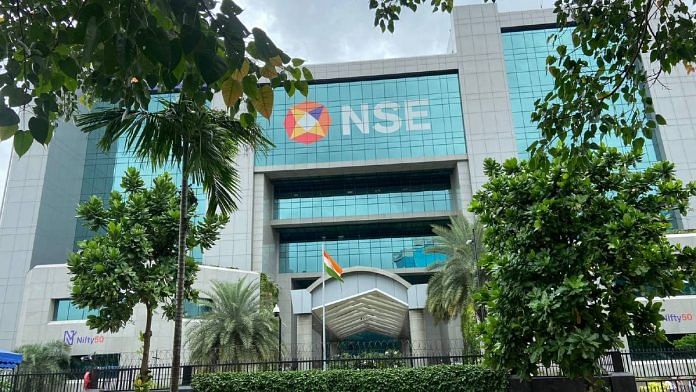New Delhi: The owner and promoters of OPG Securities — the Delhi-based brokerage firm at the centre of the National Stock Exchange (NSE) co-location scam case — deleted crucial evidence including their chats and emails with NSE employees, the Central Bureau of Investigation (CBI), which is probing the alleged manipulation of the bourse, has found.
Agency sources told ThePrint that between 2010 and 2014, Sanjay Gupta — owner of OPG Securities and one of the prime accused in the case — and his co-accused used a secondary server meant for emergencies to get “preferential access to NSE data”, which gave them an edge over other brokers.
Gupta, who was arrested in the case in June this year, had also allegedly hired software engineers Aman Kokrady and Vivek Goenka to develop the software they used to connect to the server.
These findings have been recorded in CBI’s supplementary charge sheet that was filed on 19 August. Apart from Gupta, Kokrady, and Goenka, the charge sheet names Abhilasha Kukreja, a data analyst at OPG, and former NSE chief executive officer and managing director Chitra Ramkrishna, agency sources said.
ThePrint reached OPG Securities via email and phone calls but no response was received till the publishing of this report. The report will be updated once a response is received.
In its charge sheet, the CBI has allegedly claimed that NSE’s data centre staff helped OPG access the company’s backup servers between 2010 and 2014, giving it an unfair advantage over other brokers, who could only access NSE’s primary servers.
The backup servers, being only for emergencies, had “zero load”, allowing for better and faster access to the market feed, and leading to wrongful gains for Gupta’s company, sources said.
“OPG Securities had all-day access to the secondary server, which is otherwise a backup and meant only for emergencies, such as when the primary server dispensing data breaks down,” a source told ThePrint, adding: “But since OPG was the only one connected with the secondary server, they got data faster because of the low load, giving them an unfair advantage. For this service they had paid bribes to NSE employees.”
The source further said that the investigators found that the company had deleted a lot of records of communication with NSE employees — all crucial evidence in the case. Some of the deleted evidence had been recovered from the devices seized during the investigation, the source added.
The agency also found that when the NSE switched to a “multicast server from a unicast server”, OPG “stopped performing that well”.
A unicast server is one where information can be disseminated from a single source while a multicast one disseminates information from multiple sources.
Also Read: Secret NSE phone-tap or ‘financial fraud’? Inside story of ED case that’s snared ex-IPS officer
Unfair access, split-second advantage
NSE’s co-location scam pertains to allegations that date back a decade. The CBI had first registered an FIR in connection with the scam back in 2018. In its first charge sheet in April, the CBI named Chitra Ramkrishna and former NSE chief operating officer Anand Subramanian. The agency had arrested Subramanian in February and Ramkrishna in March in connection with the case.
A co-location set-up allows the broker’s computer to be located in the same area in which the server of the stock exchange is located. This gives approximately a ten-fold speed advantage in comparison to other brokers.
According to CBI sources, Gupta bribed NSE employees to get unfair access to the NSE co-location facility between 2010 and 2014, in order to give his company this advantage.
Sources say that until 2014, information was disseminated by the NSE server to the brokers attached to the co-location facility through a tick-by-tick (TBT)-based system architecture.
In this architecture, data was disseminated in a “sequential manner”, and the broker who connected first to the exchange server received ticks — meaning market feed — before the one who connected later.
Alleged unfair access to this co-location facility meant that Gupta’s OPG Securities could log in first to the secondary server and get the data before everyone else.
“[This] allowed a split-second faster access to the data feed of NSE,” the source said, adding that even a split-second’s faster access could result in considerable gains for a stock trader.
Gupta allegedly also bribed staff at the NSE data centre into feeding him information on what time the exchange’s servers were switched on, leading to illegal gains for his company, agency sources said.
(Edited by Uttara Ramaswamy)
Also Read: Preferential access, split-second info advantage: How NSE servers were ‘compromised for gain’



